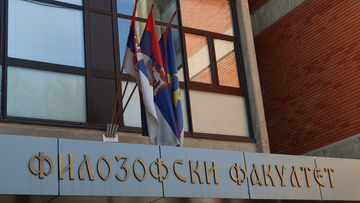Serija predavanja o estetici i filozofiji muzike - dr Vitor Gereiro
| Vreme | 08. maj 2023. 11:00 |
|---|
Ponedeljak, 8. maj, 11h, svečana sala (114)
Ponedeljak, 8. maj, 13:30h, svečana sala (114)
Petak, 12. maj, 10h, svečana sala (114)
Dr Vitor Gereiro [Vítor Guerreiro] sa Univerziteta u Portu (Portugal) će tokom maja meseca posetiti Filozofski fakultet preko mreže Erazmus+. Tom prilikom on će održati nekoliko blokova predavanja o savremenoj estetici, politici u umetnosti i filozofiji muzike. Predavanja će biti održana na engleskom jeziku. Srdačno pozivamo sve koji su zainteresovani za navedene teme da posete posete ova predavanja.
Detalji o svakom bloku predavanja:
Ponedeljak, 8. maj, 11h, svečana sala (114):
A Deflationist Approach to Art and The Aesthetic
Theories of aesthetic experience in recent analytical aesthetics divide between accounts that are more ‘phenomenological’ (in the minimal sense of a specific sort of mental state defined by an affective, hedonic, or axiological element) or more ‘epistemic’ or ‘deflationist’ accounts. One clear example of the former is Jerome Stolnitz’s ‘aesthetic attitude’ theory; a clear example of the latter is Noël Carroll’s ‘content theory’ of aesthetic experience. Some views stand somewhat ‘in the middle’, like Jerrold Levinson’s account. I want to explore a particularly radical form of deflationist approach to aesthetic experience: one that is common to both Nelson Goodman and James O. Young. Their motto could be parsed in the following manner: ‘the aesthetic is but a mode of the cognitive’. (Forget disinterested pleasure, aesthetic qualia, or any form of experiential je ne sais quoi.) Can we make (more) sense of art and the aesthetic in that way? Ultimately: do we even need special concepts of ‘Art’ and ‘The Aesthetic’ to ‘get the job done’, while not turning into Testaduras (the paradigmatic philistine) in the process?
Theories of aesthetic experience in recent analytical aesthetics divide between accounts that are more ‘phenomenological’ (in the minimal sense of a specific sort of mental state defined by an affective, hedonic, or axiological element) or more ‘epistemic’ or ‘deflationist’ accounts. One clear example of the former is Jerome Stolnitz’s ‘aesthetic attitude’ theory; a clear example of the latter is Noël Carroll’s ‘content theory’ of aesthetic experience. Some views stand somewhat ‘in the middle’, like Jerrold Levinson’s account. I want to explore a particularly radical form of deflationist approach to aesthetic experience: one that is common to both Nelson Goodman and James O. Young. Their motto could be parsed in the following manner: ‘the aesthetic is but a mode of the cognitive’. (Forget disinterested pleasure, aesthetic qualia, or any form of experiential je ne sais quoi.) Can we make (more) sense of art and the aesthetic in that way? Ultimately: do we even need special concepts of ‘Art’ and ‘The Aesthetic’ to ‘get the job done’, while not turning into Testaduras (the paradigmatic philistine) in the process?
Ponedeljak, 8. maj, 13:30h, svečana sala (114):
Formalism, cognitivism and political art
This lecture’s aim is to explore the ways in which aesthetic form functions politically in some artworks (one example could be Vera Chytilová’s 1966 film, Daisies). The main thesis is the following: form is more ‘contentful’ than the so-called ‘content’ - but one must be able to ‘read form’. Countless examples, other than Chytilová’s film, could be adduced from cinema as well as other arts. But it is a neat example of something that would be (and in fact was) accused of ‘formalism’, in its time, with all the political overtones that concept would carry. The purpose here is to present different conceptions of form in contemporary aesthetics and to critically assess both formalist and anti-formalist views on the matter. Hopefully, we shall get clearer ideas on how art can be ‘political’ in a way that is not irrelevant to its aesthetic character.
This lecture’s aim is to explore the ways in which aesthetic form functions politically in some artworks (one example could be Vera Chytilová’s 1966 film, Daisies). The main thesis is the following: form is more ‘contentful’ than the so-called ‘content’ - but one must be able to ‘read form’. Countless examples, other than Chytilová’s film, could be adduced from cinema as well as other arts. But it is a neat example of something that would be (and in fact was) accused of ‘formalism’, in its time, with all the political overtones that concept would carry. The purpose here is to present different conceptions of form in contemporary aesthetics and to critically assess both formalist and anti-formalist views on the matter. Hopefully, we shall get clearer ideas on how art can be ‘political’ in a way that is not irrelevant to its aesthetic character.
Petak, 12. maj, 10h, svečana sala (114):
The Philosophy of Music: Expression and Representation
The purpose is to acquaint students with the main theories of musical expression: arousal theories, resemblance theories, imagination theories, and formalist theories. A synopsis of formalist arguments against both expression and representation will be given, from Hanslick to Zangwill (but also Julian Dodd’s anti-contextualist arguments for ‘Pierre Menard’-like thought experiments), as well as a synopsis of replies to those arguments. The whole lecture will be set in perspective through James O. Young’s dictum that ‘expression is but an unsatisfactory way of speaking about representation’. Finally, the two most prominent cognitivist approaches to music and the emotions (Goodman’s and Young’s) will be outlined: one in terms of ‘metaphorical exemplification’, the other in terms of ‘resemblance’. Arguments for and against metaphorical exemplification will be discussed.
The purpose is to acquaint students with the main theories of musical expression: arousal theories, resemblance theories, imagination theories, and formalist theories. A synopsis of formalist arguments against both expression and representation will be given, from Hanslick to Zangwill (but also Julian Dodd’s anti-contextualist arguments for ‘Pierre Menard’-like thought experiments), as well as a synopsis of replies to those arguments. The whole lecture will be set in perspective through James O. Young’s dictum that ‘expression is but an unsatisfactory way of speaking about representation’. Finally, the two most prominent cognitivist approaches to music and the emotions (Goodman’s and Young’s) will be outlined: one in terms of ‘metaphorical exemplification’, the other in terms of ‘resemblance’. Arguments for and against metaphorical exemplification will be discussed.


